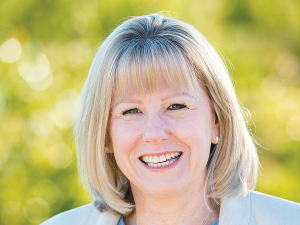Precision N application test costs 'outweigh returns'
Precision application of nitrogen can improve yields, but the costs of testing currently outweigh improved returns, according to new research from Plant and Food Research, MPI and Ravensdown.
 Sharon Kirk says new apricot varieties especially bred to give the NZ industry a shot in the arm are looking “amazing” in their first full commercial season.
Sharon Kirk says new apricot varieties especially bred to give the NZ industry a shot in the arm are looking “amazing” in their first full commercial season.
New apricot varieties especially bred to give the New Zealand industry a shot in the arm are looking “amazing” in their first full commercial season, says grower Sharon Kirk.
The new varieties, known as Nzsummer2, Nzsummer3 and Nzsummer4 – along with other trial cultivars – have been developed by Plant and Food Research specifically for the Central Otago growing region.
With an eye to improved flavour, colour and shelf life, around 50ha of the new apricots have now been planted. About half of that on Ardgour Valley Orchards, recently established on the Jolly family’s sheep and beef Ardgour Station, at Tarras.
Ardgour Valley Orchards director Sharon Kirk says the trees, planted over the last three years, were now in their first full harvest season, with a yield of about 80 tonnes expected.
She says the apricots ware looking “amazing.”
“The first of them has now gone through to the Auckland market and we’re just gearing up to go to export now.”
Kirk says the new varieties are highly “blushed” – so deeply coloured they may be mistaken for peaches at a glance.
The fruit is also getting Brix measurements of 14 to 21, “which is actually very high for an apricot”. A standard measure of dissolved solids in the juice, a Brix figure roughly corresponds to sugar percentage. Kirk says normal apricots usually sit between 7 and 14. Meanwhile, an ethylene-recessive gene improves their shelf life, making them ideal for export.
First exports would soon be going to Dubai.
The fruit is also available domestically by online order from Kirk’s Southern Fruits International website.
She adds that the new varieties don’t present any unusual difficulties to grow but they’re still determining when it’s best to harvest, and optimum parameters for storage and handling.
“You harvest them then you sit them for 24 hours in ambient and so it’s just working out how to do that,” Kirk told Hort News. “We’re learning that all as we go.”
While Ardgour is the biggest grower so far, Kirk says another 20 orchards have plantings of the new varieties.
They are not jointly marketing the fruit, but Kirk says they share information through a grower cooperative that handles the varieties.
“We are all still learning, and it’s a matter of just seeing how things go and what we need to learn, comparing it, and seeing if we can improve for the next year.”
By next season, they intend replacing the “Nzsummer” label with a new name and branding, following market feedback.
Mating wrapped up last month at the across-breed Beef Progeny Test on Pāmu’s Kepler Farm in Manapouri.
Libby Judson is a keeper of memories from an age gone by. Tim Fulton tells her story.
A New Zealand-first native tree study has highlighted the Bioeconomy Science Institute's position as a forestry research leader.
Hemp fibre processor Rubisco is relocating its core processing facility to Ashburton as part of a $20-$30 million expansion to leverage what it says is an accelerating global demand for sustainable and renewable fibres.
Tradition meets some of the latest in technology at the 2026 East Coast Farming Expo.
OPINION: Trade Minister Todd McClay and the trade negotiator in government have presented Kiwis with an amazing gift for 2026 - a long awaited and critical free trade deal with India.

OPINION: If the hand-wringing, cravat and bow-tie wearing commentariat of a left-leaning persuasion had any influence on global markets, we'd…
OPINION: With Winston Peters playing politics with the PM's Indian FTA, all eyes will be on Labour who have the…